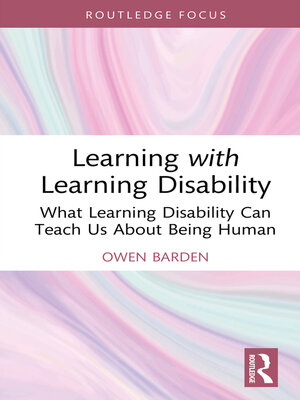Learning with Learning Disability
ebook ∣ What Learning Disability Can Teach Us About Being Human · Autocritical Disability Studies
By Owen Barden

Sign up to save your library
With an OverDrive account, you can save your favorite libraries for at-a-glance information about availability. Find out more about OverDrive accounts.
Find this title in Libby, the library reading app by OverDrive.



Search for a digital library with this title
Title found at these libraries:
| Library Name | Distance |
|---|---|
| Loading... |
This book uses the concept of "learning disability" to explore what it means to be human. It argues that we need to learn with rather than from or about learning disability. This crucial distinction means being open to what learning disability can teach us about what it means to be human. This approach comes from recognising learning disability as an organising concept – a concept which radically transforms our sense of what it means to be – or not be – a person.
After reflecting on the author's relationship to learning disability, the book explores relationships and tensions between conceptualisations of learning disability and of the human. Through historical ontology, the book initially examines how the phenomenon of "learning disability" came into being. It then explores ways in which the concept of learning disability has, over the course of the 20th and 21st centuries, radically transformed our sense not only of education and learning, but also of who is or is not deemed entitled to full citizenship and the associated rights, and so who is or is not fully human.
Each chapter of the book exposes tensions and contradictions apparent in the ways we tend to think about personhood and learning disability, illuminating them through a series a binary oppositions: human and not fully human; menacing and vulnerable; controlled and abandoned; capable and incapable; human and posthuman.
The book concludes by drawing together these tensions and contradictions to challenge the prevailing metanarrative of disability and make the case for a more inclusive conceptualisation of what it means to be human.
It will be of interest to all scholars and students of disability studies, the history of learning disability, humanism and posthumanism, and learning disability advocacy.







